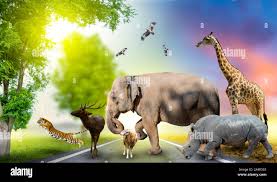The Importance of Wildlife Protection
Wildlife protection is a crucial aspect of environmental conservation that plays a significant role in maintaining the balance of ecosystems. The preservation of wildlife is essential not only for the well-being of animals but also for the health of our planet as a whole.
Conservation of Biodiversity
Wildlife protection is vital for conserving biodiversity. Each species in an ecosystem has a unique role to play, and the loss of even one species can have far-reaching consequences. By protecting wildlife habitats and preventing the extinction of species, we help maintain the delicate balance of nature.
Ecosystem Services
Wildlife plays a crucial role in providing ecosystem services that are essential for human survival. From pollination by bees and other insects to pest control by predators, wildlife contributes to agricultural productivity and overall ecosystem health. Protecting wildlife ensures the continuity of these vital services.
Preservation of Endangered Species
Many species around the world are facing the threat of extinction due to habitat destruction, poaching, and climate change. Wildlife protection efforts aim to safeguard endangered species and prevent their disappearance from the planet. By preserving these species, we protect genetic diversity and ensure their continued existence for future generations.
Economic Benefits
Wildlife protection also brings economic benefits to local communities through ecotourism and sustainable resource management. Preserving natural habitats attracts visitors who are interested in observing wildlife in its natural environment, creating opportunities for income generation and sustainable development.
Global Impact
The protection of wildlife has a global impact on climate regulation, disease control, and overall environmental health. By safeguarding ecosystems and preserving biodiversity, we contribute to mitigating climate change effects and maintaining a healthy planet for current and future generations.
Get Involved
Everyone can play a part in wildlife protection efforts. Whether through supporting conservation organizations, practicing sustainable living habits, or advocating for policies that protect wildlife habitats, each individual contribution makes a difference in preserving our natural world.
In conclusion, wildlife protection is not just about saving individual species—it is about safeguarding the intricate web of life that sustains us all. By valuing and protecting wildlife, we ensure a healthier planet for ourselves and future generations to enjoy.
Six Essential Tips for Protecting Wildlife and Preserving Natural Habitats
- Avoid littering to prevent harm to wildlife.
- Respect wildlife habitats and keep a safe distance.
- Do not feed wild animals as it can disrupt their natural behavior.
- Support conservation efforts and organizations dedicated to protecting wildlife.
- Reduce the use of single-use plastics to prevent pollution in natural habitats.
- Educate others about the importance of wildlife protection and conservation.
Avoid littering to prevent harm to wildlife.
Avoiding littering is a simple yet effective way to protect wildlife and their habitats. Discarded trash can pose serious threats to animals, such as ingestion of harmful materials or entanglement in debris. By being mindful of our waste and disposing of it properly, we can help prevent unnecessary harm to wildlife and ensure a cleaner, safer environment for all species to thrive in.
Respect wildlife habitats and keep a safe distance.
Respecting wildlife habitats and maintaining a safe distance is essential for the well-being of both animals and humans. By staying at a distance, we minimize disturbance to wildlife, allowing them to carry out their natural behaviors without stress or fear. Keeping a safe distance also reduces the risk of potential conflicts or accidents between humans and wild animals. By respecting wildlife habitats and observing from afar, we can appreciate the beauty of nature while ensuring the safety and preservation of the diverse species that call these habitats home.
Do not feed wild animals as it can disrupt their natural behavior.
Feeding wild animals may seem like a kind gesture, but it can actually harm them in the long run. When wild animals become accustomed to human-provided food, they may lose their natural foraging instincts and become dependent on handouts. This disruption of their natural behavior can lead to imbalances in their diet, increased aggression towards humans, and even spread of diseases. By refraining from feeding wild animals, we allow them to maintain their natural behaviors and ensure their overall well-being in their native habitats.
Support conservation efforts and organizations dedicated to protecting wildlife.
Supporting conservation efforts and organizations dedicated to protecting wildlife is a crucial step in ensuring the preservation of our natural world. By contributing to these initiatives, whether through donations, volunteer work, or advocacy, we play a direct role in safeguarding endangered species and their habitats. Conservation organizations work tirelessly to implement strategies for wildlife protection, conduct research, and raise awareness about the importance of biodiversity. By supporting these efforts, we can make a tangible impact in preserving our planet’s rich diversity of life for future generations to appreciate and enjoy.
Reduce the use of single-use plastics to prevent pollution in natural habitats.
Reducing the use of single-use plastics is a crucial step in wildlife protection as it helps prevent pollution in natural habitats. By minimizing the amount of plastic waste that ends up in ecosystems such as oceans, forests, and wetlands, we can safeguard the health and well-being of wildlife. Animals often mistake plastic debris for food, leading to ingestion and entanglement, which can have devastating consequences on their populations. By choosing reusable alternatives and adopting eco-friendly practices, we can make a positive impact on the environment and contribute to the conservation of wildlife for future generations.
Educate others about the importance of wildlife protection and conservation.
Educating others about the importance of wildlife protection and conservation is a key step towards fostering a culture of environmental stewardship. By raising awareness about the value of preserving biodiversity and safeguarding natural habitats, individuals can inspire positive actions that contribute to the long-term sustainability of our planet. Through education, we empower others to make informed choices, support conservation efforts, and advocate for policies that prioritize the well-being of wildlife species and their ecosystems.

